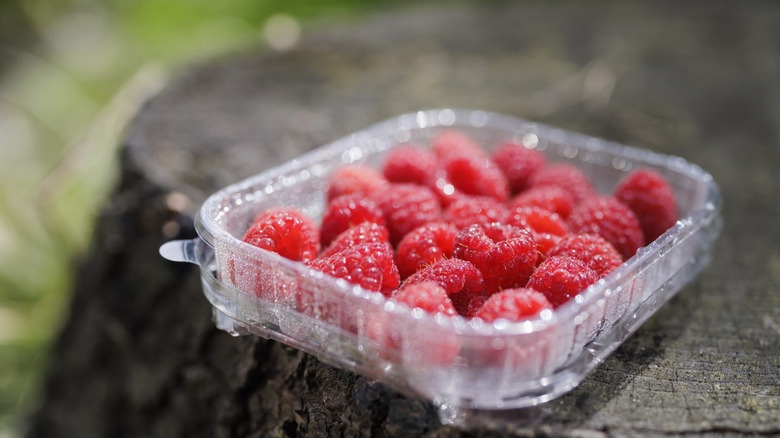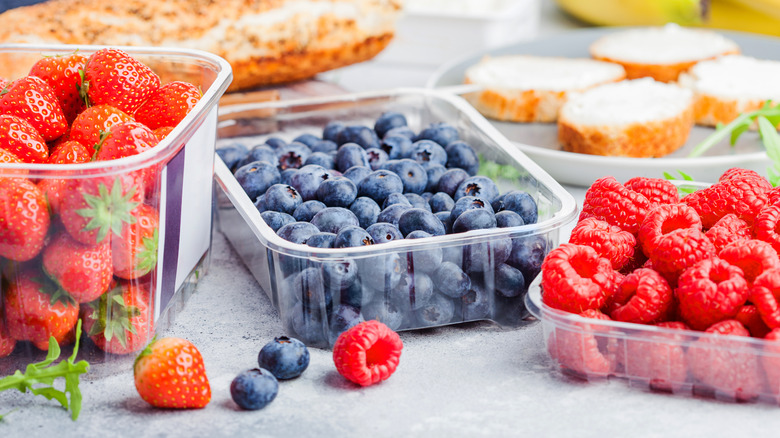Why Do Raspberries Come In Smaller Packages?
When shopping in the fresh produce department at your favorite grocery store, you've likely noticed that items like raspberries always come in small packages, compared to larger containers for fruits like strawberries or blueberries. Small raspberry packages force you to buy more items in total to get a larger amount of fruit, but there's a good reason why these small berries are sold this way — it's not about scamming you out of a few extra cents.
Smaller packages serve to protect raspberries' delicate structure. Their fleshy red drupes are very soft and tender, and they have a pocket of air in the center that provides no support. A fully ripe (or overripe) raspberry can barely support the weight of its own structure, let alone that of other berries on top of it, so manufacturers can't stuff a bunch of raspberries together in a large box without crushing the fruit. As such, a smaller amount of berries must be packed loosely in a smaller container to keep them intact.
Packaging raspberries loosely also allows for more airflow that will help them stay fresh for longer than if they were stored in an airtight container. Excess moisture is what causes berries to rot, and more space between the berries helps moisture freely evaporate, slowing inevitable bacterial growth and decay.
Raspberries don't last very long, anyway
Another reason for raspberries to come in smaller packages is the simply fact that they don't stay fresh for very long. Even when properly stored in the refrigerator, most fresh raspberries only last for two to three days before going bad. If you could buy a larger package of raspberries, who's to say you would be able to eat them all by the time their quality starts to decline?
As mentioned previously, raspberries are very sensitive to moisture, meaning the slightest change in storage conditions can trigger their demise. For instance, making the food storage mistake of washing berries before refrigerating them — rather than only washing them right before you eat them — can cause significant decay over the course of one night. Delicate raspberries can be crushed by the washing process itself, so buying a huge pack and washing them all at once, then storing them together, would basically decimate the whole package.
Realistically, if you need to keep a larger amount of raspberries on hand, you should turn to frozen berries. Unlike their fresh counterparts, frozen raspberries can retain their quality for up to a year, and come in much larger packages.
How to find the best raspberries
If you're going to spend a chunk of change on fresh produce like berries, especially expensive raspberries that aren't really sold in bulk, you might as well get the most out of your purchase. Always thoroughly examine raspberry packages so you can pick the best one.
For example, you might use the carton test to find the longest-lasting berries. Simply pick up a package of raspberries and gently flip it upside-down. Because raspberries are already loosely-packed, there should be enough room for the berries to fall down against the lid. However, overripe, decaying, and crushed raspberries will stick to the liner in the bottom of the package instead of falling, showing you just how many bad berries are in the batch. You'll then want to choose the package with the fewest berries sticking to the liner, though ideally, you would find a package with no sticking.
You can also shake fruit containers for a similar outcome, listening for the soft rattle of perfectly ripe fruit or the dull thud of overripe fruit. However, shaking may prove a little too rough for berries as delicate as raspberries, so we recommend the aforementioned gentle flip as your primary testing method. Strawberries and blueberries are more suitable for shaking.



